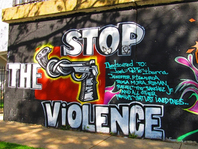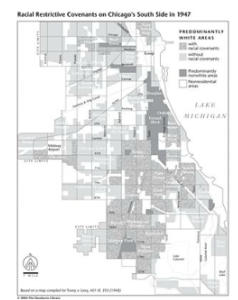 [ While there's no need to have read my previous post to read this one, folks who have will recognize that this is the second of two posts in response to the claim that the best strategy to end violence on the south and west sides of Chicago is the spread of the gospel through evangelism. -David] If we are going to think about evangelism as a strategy to fix the problem of violence in Chicago, it makes sense to begin with the question: is a lack of knowledge of the gospel the cause of the shootings among young black men in Chicago? Well, it’s certainly clear that the absence of Christianity cannot cause shootings in the way we talk about one billiard ball causing another ball to move. It cannot be simple cause and effect. If it were, all non-Christians would be shooting people all the time. It would be hard to explain how, for example, Japan is only 2% Christian but has one of the lowest murder rates in the world.  Racial Restrictive Covenants in Chicago in 1947. (click on the map for more information) Racial Restrictive Covenants in Chicago in 1947. (click on the map for more information) The reason a lack of Christian faith does not cause murders is because the sinful state of fallen humanity does not cause particular sins; it is the condition in which particular sins happen. Which particular sins are committed in a particular neighborhood and at what rate depends on more than just original sin. Some communities of young people express their sinful condition in the form of gossip, slander, and the occasional fistfight. Other communities express sin in the form of frequent, fatal shootings. This is not because the latter group is somehow under a deeper cloud of original sin.[1] The reason for the difference is the historical, social, and political context in which they live. Now, I’m sure that as soon as I say that behavior depends on context, a lot of people jump off the train right there. We all know the standard objections to such claims—people are responsible for their own choices, we are free, no one forced anyone to shoot anyone else—so let me say immediately that I think freedom is a real thing and that we are responsible for the choices we make. My point, however, is that we are not responsible for the choices we face. To see what I mean, think about how you would judge my moral choices versus those of a gang member: do I deserve credit for not being in a gang? I (believe it or not) have never been invited to be in one. I have never had to choose not to join. There are some contexts (like mine) where gang membership is not a real option, some places where it is, and some places—like parts of Chicago today—where boys are in gangs by default based on where they live. They have to make a series of very hard decisions (like staying inside every evening all summer) just to opt out of gang life.[2] I honestly cannot tell you what I would do in that context. We can see, then, that people who share equally in the tendency to sin, nevertheless sin in different ways based on their context. Is it true that there are exceptions, kids growing up in Englewood who stay inside studying and go on to become successful doctors and lawyers? Of course. Are there kids who grow up in privilege who go on mass shootings? Yes. That takes away nothing from what I’ve said about the importance of context. Poverty is a good example: poor kids who do everything right, given the options they have, don’t turn out much better off than rich kids who do everything wrong.[3] So, if you want to diagnose the roots of the violence in these neighborhoods, the question really is not what causes shootings, but what causes the higher rate of shootings there compared to other places where the people are no less sinful, but much less lethal. So, what is different about them? The difference is in the set of choices kids face. The reality is that in Chicago there is a clear geography of violence and this geography has a history. The stark differences between Chicago's neighborhoods is no accident; it's the result of intentional segregation. You cannot understand Chicago’s crime map today without understanding the pressure of Jim Crow and lynching that drove the Great Migration, the way racist property covenants and federal housing policy[4] prevented African Americans from building wealth through home ownership, the predatory banking practices that kept them poor, the failing schools that block their paths to advancement, or mass incarceration driven by (among other things) unjust policing practices and the drug epidemic, during which we criminalized—rather than treated—the victims. In short, black folks coming to the city with nothing were actively prevented from moving out of poverty in ways that immigrants coming to Chicago from Ireland, Italy, and Poland were not. Again, I’m not saying the shooters on the streets today have no choice because of this history, I’m saying they have bad choices. When I was younger, I would have read that last paragraph and dismissed it as the ramblings of some militant liberal. Then I actually did the research and discovered that it's just a simple statement of what happened. The reality is tragic and political ideology has nothing to do with it. Liberals can make the mistake of thinking historical and social forces simply cause all social evils and that perfecting institutions and laws will perfect society. Conservatives can make the mistake of emphasizing personal responsibility to the point that they forget how much our personal and collective histories shape our lives. In reality, yes, individuals are responsible for making good choices, but the array of choices individuals of different classes and races face is a collective responsibility. Only by understanding history can we see that the evil afflicting Chicago' African American youth was not simply cooked up by Satan, to be resisted only by the spread of God’s word (though I’m not denying the spiritual aspects). The conditions contributing to this situation were also created in Congress and the courts, in corporate boardrooms, in offices at the Federal Housing Administration and the Chicago Police Department, at housing association and school board meetings. These actions need to be undone, repealed, and corrected. This requires smart policy and intelligent intervention that does more good than harm. It needs informed, responsible citizenship and knowledge of the technical aspects of policy-making, the details of which are not found in the Bible. It is, of course, true that the government is not going to make everybody good and eradicate violence. Sin, injustice, and violence persist in the most well governed nations. People still need Jesus. That said, good governance can stop the damage done by a history (and current situation) of bad governance, and can help undo what in the past has contributed so much to the problems we see today. It can help stop the expressions of the general presence of sin from taking the violent form that they do here. It is fine to believe that the spread of the gospel is a good way to empower people to make good choices from the available options. I agree. We just have to remember it in no way excuses us from the work of making sure that good choices are available to everyone. [1] this is precisely the prejudice I warned about in my previous post [2] for more on this, check out this amazing podcast. [3] Thanks, Russell, for putting me on to this. [4] Yeah, I know this link is about Indianapolis, not Chicago, but is a good explanation of the federal laws that affected every major city, including Chicago.
0 Comments
Leave a Reply. |
Archives
September 2020
Categories
All
|
 RSS Feed
RSS Feed